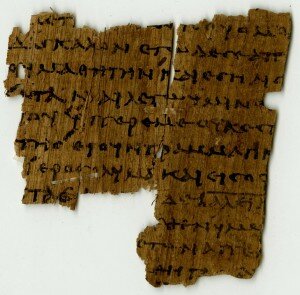Who Wrote the Gospel of John?
 Who actually wrote what is in the Bible? This is an important question. Perhaps even more importantly, who actually wrote the Gospels, the four books in the Bible that tell us about Jesus' life and teachings? And if we cannot know who wrote them, on what grounds can we trust what they say?Over the next few posts I will be looking at the Gospel of John in particular. Contrary to many biblical critics, these posts will argue that the author of this Gospel is, believe it or not, actually the person from which it was named. We will start the actual date of this book's composition.
Who actually wrote what is in the Bible? This is an important question. Perhaps even more importantly, who actually wrote the Gospels, the four books in the Bible that tell us about Jesus' life and teachings? And if we cannot know who wrote them, on what grounds can we trust what they say?Over the next few posts I will be looking at the Gospel of John in particular. Contrary to many biblical critics, these posts will argue that the author of this Gospel is, believe it or not, actually the person from which it was named. We will start the actual date of this book's composition.
Date of the Gospel’s Composition
D.A. Carson and Douglas Moo write, “During the past 150 years, suggestions as to the date of the fourth gospel have varied from before A.D. 70 to the final quarter of the second century.”[1] It is universally agreed upon that the Gospel of John was the last of the four biblical gospels that were written. Those who believe that John himself was not the author of this gospel argue for a date in the 2nd century. On the other hand, others argue for a date as early as the A.D. 60s.Andreas Kostenberger writes, “The period subsequent the destruction (of the temple) seems likely…. John’s emphasis on Jesus’ replacement of the temple and Jewish feasts probably represents an effort to exploit the temple’s destruction evangelistically in an effort to reach diaspora Jews and Gentiles attracted to Judaism.”[2]Some argue that the silence of John’s Gospel on the Jerusalem temple points to a date before the temple of destroyed (which was in 70). However, “If some time had elapsed, perhaps a decade, between the destruction of the temple and the publication of this gospel, so that the initial shock of the reports had passed, there is no reason to think that the evangelist should have brought it up.”[3]The absence of the temple’s destruction is about the only sort of evidence to argue for a date before 70 A.D. However, as was just given, there are plenty of reasons as to why this “argument from silence” is quite weak. Arguments for a second century date have also been presented. For example, “Ferdinand Christian Baur, the head of the “Tubingen school,’ attributed John’s Gospel to a Hellenistic community and dated it between A.D. 150-170.”[4]However, the discovery of an Egyptian papyrus fragment called the John Rylands papyrus that contains a few verses from John’s gospel and is dated around 125 AD has dispelled any sort of later composition hypothesis.This means that John’s gospel was (clearly) written before 125, and also early enough for copies to spread all the way to Egypt. Kostenberger concludes, “Allowing for John’s original manuscript to be copied and to make its way from Ephesus in Asia Minor to Egypt, this pushes the date of the writing of John’s Gospel back to the late first century.”[5]Thus, this makes the most plausible date for the composition for John’s Gospel to be between 80-95. Among other arguments, the discovery of the John Rylands papyrus takes the second century pretty much out of the question. D. A. Carson gives three arguments for a date between 80-85:
- There is no convincing pressure to place the Gospel of John as early on the spectrum as possible, but there is a little pressure to place John as late on it as possible.
- At several points John’s Gospel uses language that is on its way toward the less restrained theologically less nuanced speech of Ignatius (thus arguing against an early date).
- It is hard to believe that, if the Fourth Gospel were written after AD 70, the date was immediately after AD 70…The reverberations around the Empire, for both Jews and Christian’s were doubtless still too powerful. A little time needed to elapse before a document like the Fourth Gospel could be free not to make an explicit allusion to the destruction of the temple.[6]
With the Gospel of John being the last Gospel written, having being written by John (which will be argued), no mention of the destruction of the temple, the belief of the early church fathers that it was written by John at a later date, as well as the language with which John writes and his theological “teachings” in the Gospel, the composition between 80-95 can be confidently believed.
[1] D.A. Carson and Douglas J. Moo, An Introduction to the New Testament, 2nd ed. (Grand Rapids, Mich.: Zondervan, 2005), 264.[2] Andreas J. Köstenberger, Encountering John: the Gospel in Historical, Literary, and Theological Perspective (encountering Biblical Studies), annotated edition ed. (Grand Rapids, MI: Baker Academic, 2002), 25.[3] Carson and Moo, 264.[4] Kostenberger, 211.[5] Ibid.[6] D.A. Carson, The Gospel According to John (Grand Rapids, Mich.: Wm. B. Eerdmans Publishing Co., 1991), 87.